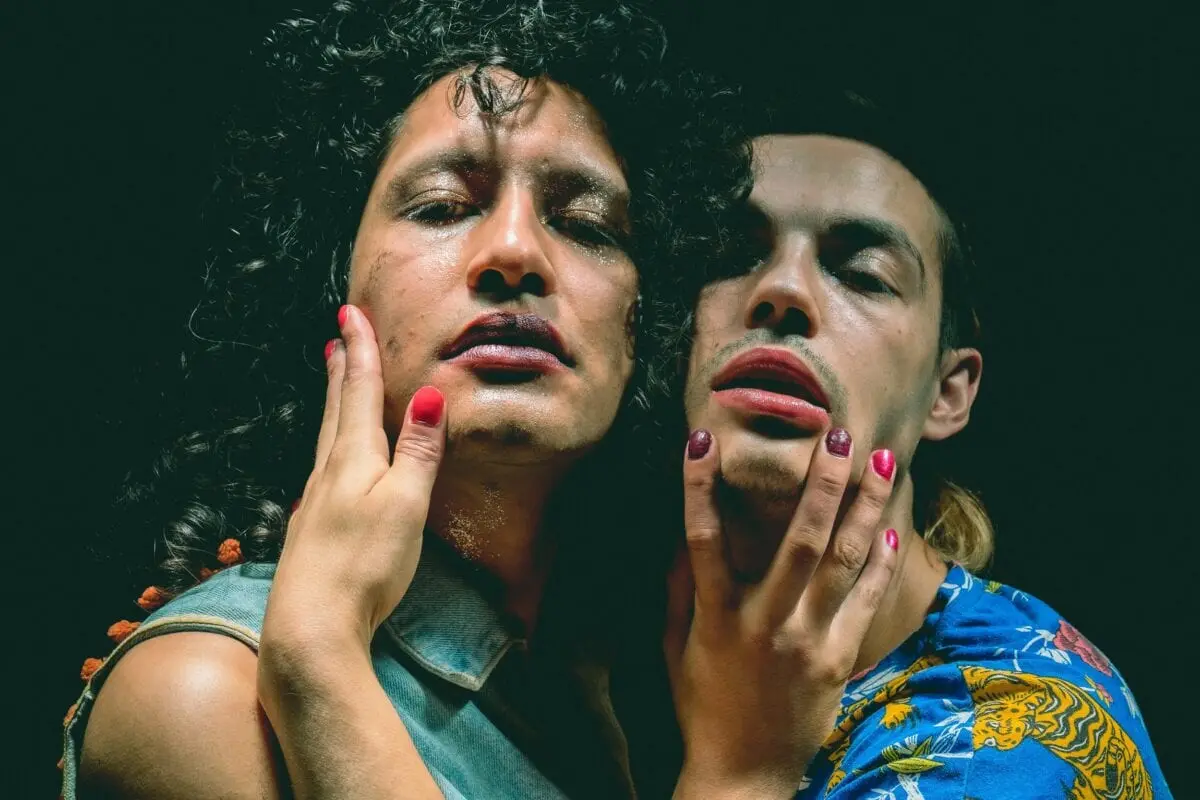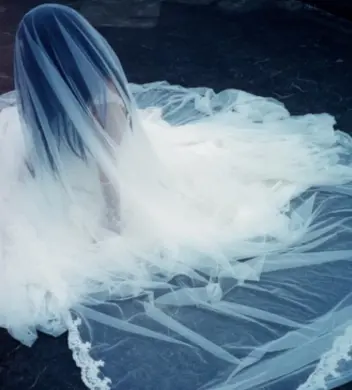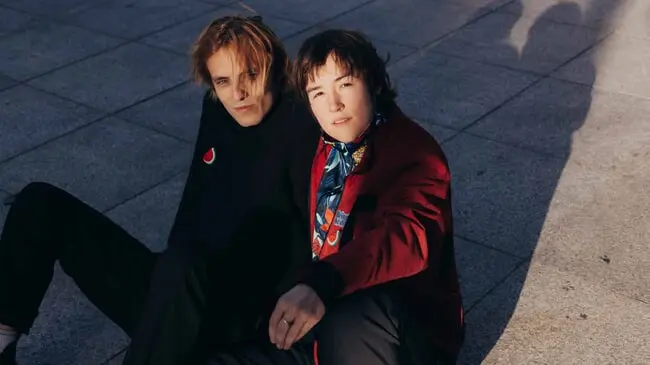On ghosts, resistance and remembering through movement

This autumn, Kaaitheater opens its stages to bodies that speak where words often fail. Across Brussels, a series of performances summons histories, myths, and lived experiences into dance, theatre, and installation. From migration and exile to ecology and political struggle, these works trace the invisible forces that shape memory, home, and resistance. They transform the theatre into a space of reflection, encounter, and shared reckoning. (cover image: Arnaud Beelen)
Desirée 0100 & Lulu Muñoz - La Noche de Aparición
30 + 31.10.2025
Brussels, De Kriekelaar
free for Different Class members
image: Lena Capilla
La Noche de Aparición by Désirée 0100 and Lulu Muñoz merges Mexican folklore with clowning and dance. Across three tales (La Procesión de los Muertos, Los Narcosatánicos, and La Llorona), ghosts, laughter, and sorrow coexist. The work navigates loneliness, homesickness, and the thrill of social gatherings in liminal spaces. Horror and humour intermingle, creating a narrative that is playful but profound. For the two artists, it is a ritual of reconciliation, connecting the landscapes of their homelands with their lives in Belgium, and a celebration of survival and memory, where movement conjures presence and absence simultaneously.
<img class="editorial-image" src="https://cdn.prod.website-files.com/61eebcc683107b99137f4423/68e4fea00b76dce5b84c5b6d_desiree%20copy.avif"/>
Nora Chipaumire - Dambudzo
16 - 18.10.2025
Brussels, Les Halles de Schaerbeek
In Dambudzo, nora chipaumire constructs a living, anti-genre space at Les Halles de Schaerbeek. The piece takes shape as a Zimbabwean shabini: a bar turned hub for debate, sound, and insurgent energy. Plastic paintings, light, and the dancers’ bodies form a malleable wall, through which movement, sound, and thought constantly penetrate. The work confronts the legacies of colonial education while creating a space for collective questioning. Dambudzo (trouble in Shona) names both the dissonance and the possibility for resistance. Audiences are invited to navigate the tension between structure and chaos, witnessing rebellion as a performative act.
<iframe width="100%" height="315" src="https://www.youtube.com/embed/FeMwYbi_ckY?si=LMcoFvnVFGjiQ6Kf" title="YouTube video player" frameborder="0" allow="accelerometer; autoplay; clipboard-write; encrypted-media; gyroscope; picture-in-picture; web-share" referrerpolicy="strict-origin-when-cross-origin" allowfullscreen></iframe>
Léo Lérus - Gounouj
28 + 29.11.2025
Brussels, Les Halles de Schaerbeek
Gounouj, by Guadeloupean choreographer Léo Lérus, takes its name from the Creole word for frog. The work is inspired by Gros Morne and Grande-Anse, a region in Guadeloupe that has reached a ‘phase of climax’, a rare moment of ecological balance between land, flora, fauna, and weather conditions. Today, human activity and climate change pose a threat to this fragile stability. The piece reflects the complex emotions this provokes: sadness, frustration, anger, and despair mix with longing and hope for a better future. Lérus channels these tensions through saudade, a bittersweet nostalgia that combines melancholy and hope, and bousyè, a Creole term describing the vulnerable shedding of a shell, used here as a metaphor for human growth and openness to change. Natural sounds recorded on-site (birds, the ocean, and a chorus of frogs) shape the atmosphere and guide the dancers’ movements. The choreography moves between extremes, a tension between fragility and strength, reflecting the vulnerability of the environment and the joy of dance.
<iframe width="100%" height="315" src="https://www.youtube.com/embed/T1D35qeg0-g?si=5TlfbaG-YqJifZmG" title="YouTube video player" frameborder="0" allow="accelerometer; autoplay; clipboard-write; encrypted-media; gyroscope; picture-in-picture; web-share" referrerpolicy="strict-origin-when-cross-origin" allowfullscreen></iframe>
Ali Chahrour - When I Saw the Sea
09 - 11.12.2025
Brussels, Théâtre Les Tanneurs
Ali Chahrour’s When I Saw the Sea gives voice to Zena, Tenei, and Rania, three women who survived Lebanon’s Kafala system, which allows employers to exercise almost total control over the employment and migration status of migrant workers. On a sparse stage, they recount trauma through dance, music, and ritualised gestures. Abed Kobeissy’s compositions and singer Lynn Adib’s voice amplify their stories of confinement, resilience, and courage. The sea becomes a powerful metaphor, a horizon of possibilities and a witness to suffering and liberation. Chahrour transforms intimate testimonies into a collective act of remembrance, insisting on visibility for lives often erased.
<div style="padding:56.25% 0 0 0;position:relative;"><iframe src="https://player.vimeo.com/video/1078670526?badge=0&autopause=0&player_id=0&app_id=58479" frameborder="0" allow="autoplay; fullscreen; picture-in-picture; clipboard-write; encrypted-media; web-share" referrerpolicy="strict-origin-when-cross-origin" style="position:absolute;top:0;left:0;width:100%;height:100%;" title="Ali Chahrour – When I saw the Sea"></iframe></div><script src="https://player.vimeo.com/api/player.js"></script>
Ecopolis
29.11.2025
Brussels, various locations
free for Different Class members
Finally, on 28 November, Ecopolis gathers thinkers and artists to imagine justice and care on a planetary scale. Joyeeta Gupta, Jens Meijen, Kes Otter Lieffe, and Jonas Staal lead discussions on climate justice, queer resistance, AI, and the power of fiction. At the same time, interactive formats invite participants to write, make, and reflect together. From panel talks to guided tours and sonoreille walks, the festival turns ideas into action, showing that shaping a fairer future happens through dialogue, creativity, and collective movement.
<div class="editorial-banner"> <div class=“editorial-credits”>kaaitheater.be</div>
Different Class works with the interest of their community at heart.
Our work’s purpose is to foster a solid network for independent artists, those who love them, and those who want to support them. Become a member to contribute to the local Belgian art scene.





